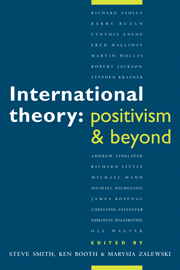Book contents
- Frontmatter
- Contents
- List of contributors
- Preface and acknowledgements
- Introduction
- I Debates
- II Legacies
- III Silences
- IV Openings
- V Directions
- 14 The last post?
- 15 Probing puzzles persistently: a desirable but improbable future for IR theory
- 16 The future of international relations: fears and hopes
- 17 75 years on: rewriting the subject's past – reinventing its future
- 18 ‘All these theories yet the bodies keep piling up’: theories, theorists, theorising
- Index
15 - Probing puzzles persistently: a desirable but improbable future for IR theory
Published online by Cambridge University Press: 09 March 2010
- Frontmatter
- Contents
- List of contributors
- Preface and acknowledgements
- Introduction
- I Debates
- II Legacies
- III Silences
- IV Openings
- V Directions
- 14 The last post?
- 15 Probing puzzles persistently: a desirable but improbable future for IR theory
- 16 The future of international relations: fears and hopes
- 17 75 years on: rewriting the subject's past – reinventing its future
- 18 ‘All these theories yet the bodies keep piling up’: theories, theorists, theorising
- Index
Summary
It is sheer craziness to dare to understand world affairs. There are so many collective actors – states, international organisations, transnational associations, social movements and sub-national groups – and billions of individuals, each with different histories, capabilities and goals. And they all interact with innumerable others, thus creating still more historical patterns that are at all times susceptible to change. Put more simply, world affairs are pervaded with endless details, far more than one can hope to comprehend in their entirety.
And if the myriad details comprising the international scene seem overwhelming during relatively stable periods, they seem that much more confounding at those times when dynamism and change become predominant. Such is the case as the twentieth century draws to a close. In all parts of the world long-established traditions and relationships are undergoing profound and bewildering transformations. Indeed, the pace of change has been so rapid, with the collapse of the Soviet Union following so soon after the end of the Cold War – to mention only the most dramatic of the changes that have cascaded across the global landscape – that it becomes reasonable to assert that change is the only constant in world affairs!
And we dare to think we can make sense of this complex, swift-moving world, with its welter of details, intricate relationships, mush-rooming conflicts, and moments of co-operation! How nervy! How utterly absurd! What sheer craziness!
But the alternatives to seeking comprehension are too noxious to contemplate, ranging as they do from resorting to simplistic and ideological interpretations to being propelled by forces we can neither discern nor influence.
- Type
- Chapter
- Information
- International TheoryPositivism and Beyond, pp. 309 - 317Publisher: Cambridge University PressPrint publication year: 1996
- 3
- Cited by



